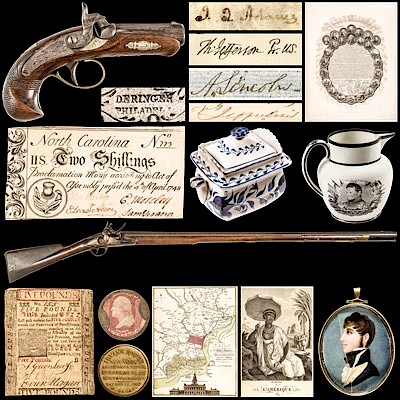1755 Colonel ADAM STEPHEN Friendly Fire Military Error + Founder Martinsburg, VA
Lot 102
Categories
Estimate:
$1,000 - $1,500
Absentee vs Live bid
Two ways to bid:
- Leave a max absentee bid and the platform will bid on your behalf up to your maximum bid during the live auction.
- Bid live during the auction and your bids will be submitted real-time to the auctioneer.
Bid Increments
| Price | Bid Increment |
|---|---|
| $0 | $10 |
| $200 | $20 |
| $300 | $25 |
| $500 | $50 |
| $1,000 | $100 |
| $2,000 | $200 |
| $3,000 | $250 |
| $5,000 | $500 |
| $10,000 | $1,000 |
| $20,000 | $2,000 |
| $30,000 | $2,500 |
| $50,000 | $5,000 |
| $100,000 | $10,000 |
| $200,000 | $20,000 |
| $300,000 | $25,000 |
| $500,000 | $50,000 |
About Auction
By Early American History Auctions
Oct 19, 2019
Set Reminder
2019-10-19 12:00:00
2019-10-19 12:00:00
America/New_York
Bidsquare
Bidsquare : Historic Autographs-Currency-Political-Americana-Militaria-Guns
https://www.bidsquare.com/auctions/early-american-history-auctions/historic-autographs-currency-political-americana-militaria-guns-4513
326 Lots of Rare, Historic Autographs, Americana, Civil War Era, George Washington, Abraham Lincoln, Black History, Revolutionary War Era, Colonial America, Federal Period, War of 1812, Colonial Currency, Indian Peace Medals & more... Early American History Auctions auctions@earlyamerican.com
326 Lots of Rare, Historic Autographs, Americana, Civil War Era, George Washington, Abraham Lincoln, Black History, Revolutionary War Era, Colonial America, Federal Period, War of 1812, Colonial Currency, Indian Peace Medals & more... Early American History Auctions auctions@earlyamerican.com
- Lot Description
Autographs
Colonel Adam Stephen of Drunken "Friendly Fire" Military Error and the Founder of Martinsburg, Virginia
ADAM STEPHEN (1718-1791). Virginia Colonial Militia under George Washington during the French and Indian War, later served under Washington again in the American Revolutionary War, rising to lead a division of the Continental Army. After a "friendly fire" incident in the 1777 Battle of Germantown, Stephen was found to have been drunk during the battle, and was cashiered out of the Army. He later founded Martinsburg, West Virginia.
January 6, 1755-Dated, French and Indian War period, Manuscript Document Endorsed and Signed as "paymaster of the Virga. forces," 1 page, measuring 4.25" x 8", Choice Very Fine. A request "To Collo. Stephen" from Thomas Longden, "I am Indebted to Messrs Carlyle & Dalton Nine pounds Eleven Shillings, please to deduct out of my pay after the rate of Two pounds, each two months till discharges of the said debt... ". A very rare and historic signature and French and Indian War Document where Adam Stephen was the acting Paymaster for George Washington's Virginia militia soldiers!
Adam Stephen (1718 - 1791) was a Scottish-born doctor and military officer. He came to North America, where he served in the Virginia Colonial Militia under George Washington during the French and Indian War. He served under Washington again in the American Revolutionary War, rising to lead a division of the Continental Army. After a friendly fire incident in the 1777 Battle of Germantown, Stephen was found to have been drunk during the battle, and was cashiered out of the army. He later founded Martinsburg, West Virginia.
Adam Stephen was born in Scotland. He earned a degree at King's College in Aberdeen, and studied medicine in Edinburgh. He then entered Royal Navy service on a hospital ship before emigrating to the British province of Virginia in the late 1730s or early 1740s. There he established a medical practice in Fredericksburg. He entered the provincial militia in 1754, and became lieutenant colonel of the Virginia Regiment under George Washington. That year he participated in Washington's expedition that climaxed with the Battle of Jumonville Glen and the Battle of Fort Necessity, the opening battles of the French and Indian War. He continued to serve with the regiment and was involved in the disastrous Braddock Expedition of 1755 and other expeditions. When the war ended in 1763, he took over command of the regiment from Washington, and assisted in putting down Pontiac's Rebellion.
When the American Revolutionary War broke out, he offered his services to the Continental Army, again serving under Washington. He was with the army during the New York and New Jersey campaigns of 1776 and early 1777, and, as a major general, was given command of a division in Washington's army during the defense of Philadelphia. After the October 1777 Battle of Germantown he was court martialed and it was found that Stephen was drunk at the time of the battle; he was stripped of his command and cashiered out of the army.
He returned to his home in Virginia, and is said to have laid out the plan for Martinsburg in what is now West Virginia in 1778. He named it after a friend, Colonel Thomas Bryan Martin, and became the sheriff of Berkeley County, of which Martinsburg became the county seat. In later years he was joined there by Generals Horatio Gates and Charles Lee, who both purchased property in the county. In 1788 he was elected to the Virginia Ratifying Convention, which ratified the Constitution of the United States.
Stephen was married and had one child, a daughter named Ann. He died in Martinsburg in 1791, and is buried beneath a monument erected in his honor there.
- Shipping Info
-
Early American provides in-house worldwide shipping. Please contact us directly if you have questions about your specific shipping requirements.
-
- Buyer's Premium



 EUR
EUR CAD
CAD AUD
AUD GBP
GBP MXN
MXN HKD
HKD CNY
CNY MYR
MYR SEK
SEK SGD
SGD CHF
CHF THB
THB












